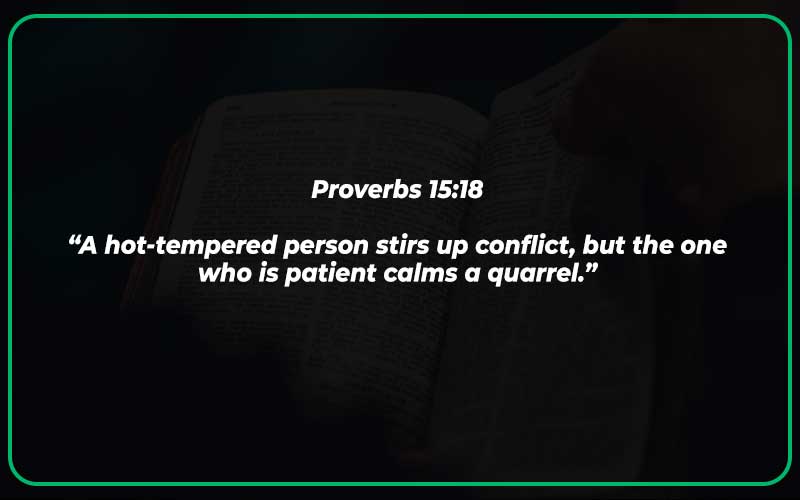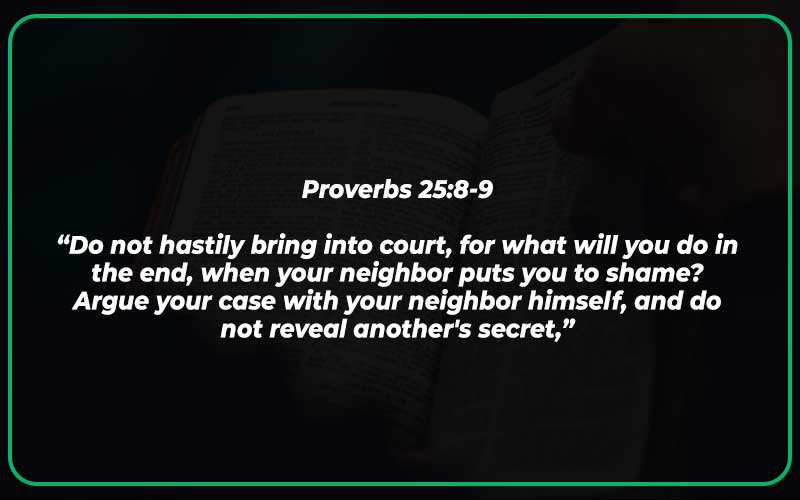Quarrels and conflicts can strain relationships and hinder personal growth.
If you seek guidance on fostering peace and harmony, join us on a biblical exploration of verses that address the topic of quarreling.
Discover the wisdom within these scriptures, offering insights on communication, forgiveness, and building healthy relationships rooted in love and understanding.
Also Read: 21 Bible Verses about Not Caring (With Commentary)
Bible Verses about Quarreling
Proverbs 17:14
“The beginning of strife is like letting out water, so quit before the quarrel breaks out”
Proverbs uses a metaphor of water bursting from a dam to describe the unpredictable and uncontrollable nature of quarreling. The verse asserts that the best way to avoid a quarrel is to walk away before it starts. It teaches us that it is better to choose peace over the satisfaction of winning an argument.
Proverbs 20:3
“It is to one’s honor to avoid strife, but every fool is quick to quarrel.”
This verse reminds us that we should avoid quarrels because it is a sign of being wise, level-headed, and mature. It implies that those who engage in quarrels with impatience and anger reveal themselves as mere fools to others. Therefore, it is not only essential to avoid quarrels for personal peace, but it is also for social well-being.
Proverbs 29:22
“An angry person starts fights; a hot-tempered person commits all kinds of sin.”
This verse reminds us that quarreling stems from uncontrolled anger. It shows that anger can make us do things that we would not normally do, things that can bring guilt and shame. Thus, we ought to avoid quarreling and deal with our anger in a healthy way, such as through prayer, calming techniques, and seeking counsel.
James 4:1-2
“What causes quarrels and what causes fights among you? Is it not this, that your passions are at war within you? You desire and do not have, so you murder. You covet and cannot obtain, so you fight and quarrel. You do not have because you do not ask.”
This verse identifies the root cause of quarrels as one’s sinful nature and desires for things that we do not have. It teaches us that we should seek God’s help and His will in our lives and learn to be content with what we have, thus avoiding quarrels and conflicts.
Proverbs 15:18
“A hot-tempered person stirs up conflict, but the one who is patient calms a quarrel.”
This verse teaches us that having a gentle spirit and showing patience in the face of conflict can calm things down and prevent quarrels. It shows that being kind and compassionate instead of being angry and resentful is the way to promote peace and a healthy relationship with others.

Proverbs 26:17
“Like one who grabs a stray dog by the ears is someone who rushes into a quarrel not their own.”
This verse illustrates the danger of getting involved in a quarrel that is not ours. It is important to weigh the pros and cons before getting involved in a conflict that may not be our problem to solve as it can cause more harm than good. We should learn to let go of irrelevant quarrels and focus on our priorities.
Proverbs 29:9
“If a wise person goes to court with a fool, the fool rages and scoffs, and there is no peace”
This proverb teaches us that there are no benefits to quarreling with a foolish person or getting into an argument in court. It is wise to avoid such conflicts to maintain peace and not arguing with someone who has no intention of resolving any issue.
Proverbs 10:12
“Hatred stirs up conflict, but love covers over all wrongs.”
This verse reminds us that quarrels and conflicts are due to the presence of hatred. However, love helps to calm these quarrels and resolve disputes. It is a powerful force that can overcome any wrongs and seek to restore peace in any relationship, thereby covering all wrongs.
Ephesians 4:31-32
“Let all bitterness and wrath and anger and clamor and slander be put away from you, along with all malice. Be kind to one another, tenderhearted, forgiving one another, as God in Christ forgave you.”
The verse emphasizes the importance of forgiving others as God in Christ forgave us and putting aside bitterness, anger, malice, and other negative emotions that lead to quarreling. We should seek kindness and compassion as a tool in our arsenal when we approach to end any potential quarrels and towards peaceful resolutions.
Matthew 5:9
“Blessed are the peacemakers, for they will be called children of God.”
This verse reminds us that those who strive for peace amidst quarrels are known as children of God because Christ was a peacemaker and called for peace. Christians who wish to be close to our Lord must seek peaceful resolutions and not quarrel with others.
Proverbs 6:16-19
“There are six things that the Lord hates, seven that are an abomination to him: haughty eyes, a lying tongue, and hands that shed innocent blood, a heart that devises wicked plans, feet that make haste to run to evil, a false witness who breathes out lies, and one who sows discord among brothers.”
This verse warns against those who create conflict and discord in relationships and spread gossip and rumours, showing how God feels about it. We should be mindful of how we speak and act around others so that we don’t sow discord and instead seek to bring unity, peace and love with others.
Proverbs 13:10
“By insolence comes nothing but strife, but with those who take advice is wisdom.”
This verse encourages us to seek wise counsel before making decisive choices that can lead to quarrels. It teaches us to be humble and open-minded in seeking advice on how to handle an issue in the right way, and not with insolence, which can escalate conflicts.
Proverbs 29:11
“Fools give full vent to their rage, but the wise bring calm in the end.”
This verse teaches us that foolish people always let their emotions run wild and get the best of them, leaving them unable to resolve conflicts amicably. However, wise people approach conflict with a clear head, seeking practical solutions and bringing peace to others.
1 Timothy 6:4
“…he is conceited and understands nothing, but has an unhealthy interest in controversies and quarrels about words that result in envy, strife, malicious talk, evil suspicions”
This verse points out those who have unhealthy interests in disagreements and quarrels, resulting in contaminated relationships and malicious talk. We should be cautious and avoid such people so that we do not get entangled in unnecessary quarrels.
James 1:19-20
“Know this, my beloved brothers: let every person be quick to hear, slow to speak, slow to anger; for the anger of man does not produce the righteousness of God.”
James reminds us of the importance of active listening, measured response, and controlling our anger so that righteousness can be born. By implementing the three actions, we can humble ourselves and avoid quarrels in our relationships.
Proverbs 25:8-9
“Do not hastily bring into court, for what will you do in the end, when your neighbor puts you to shame? Argue your case with your neighbor himself, and do not reveal another’s secret,”
This proverb warns us to avoid quarrels that lead to legal action. It is a reminder that we should pursue to resolve conflicts with the individual first, and not to air out dirty laundry provided it is not too horrid. It encourages us to have a healthy relationship with our neighbours instead of exacerbating issues.

Matthew 18:15
“If your brother sins against you, go and tell him his fault, between you and him alone. If he listens to you, you have gained your brother..”
This verse emphasizes the importance of confronting an issue directly with the person involved. It encourages us to address the problem in a private setting, seeking personal resolution, and promoting peaceful relationships.
Proverbs 14:29
“Whoever is slow to anger has great understanding, but he who has a hasty temper exalts folly.”
The verse emphasizes the importance of being aware of our emotions and controlling our temper in any situation. Being slow to anger requires patience, self-control, and great understanding, leading to fewer unnecessary quarrels and conflicts.
What does the Bible say about Quarreling?
The Bible addresses the topic of quarreling and conflicts in various passages, providing insights and guidance on how to handle disputes and disagreements. Quarreling is generally seen as a negative behavior, discouraged in the scriptures. It is important to note that while some instances of conflict are inevitable, the Bible encourages believers to resolve conflicts in a manner that promotes peace, understanding, and reconciliation.
Avoiding Quarreling and Pursuing Peace
Proverbs 17:14 (NIV) states, “Starting a quarrel is like breaching a dam; so drop the matter before a dispute breaks out.” This verse emphasizes the importance of avoiding unnecessary conflicts, as they can escalate and cause more significant harm. The Bible encourages believers to be peacemakers and to seek harmony with others.
Resolving Disputes Amicably
In Matthew 18:15 (NIV), Jesus provides a specific approach for resolving conflicts within the Christian community, saying, “If your brother or sister sins, go and point out their fault, just between the two of you. If they listen to you, you have won them over.” This verse emphasizes the need for addressing issues directly and privately, seeking resolution rather than escalating the problem through gossip or public confrontation.
Avoiding Contentiousness and Anger
The book of Proverbs frequently warns against quarreling and being quick-tempered. Proverbs 15:18 (NIV) states, “A hot-tempered person stirs up conflict, but the one who is patient calms a quarrel.” Similarly, Proverbs 20:3 (NIV) advises, “It is to one’s honor to avoid strife, but every fool is quick to quarrel.” The Bible encourages believers to exhibit patience, gentleness, and self-control when dealing with conflicts.
Seeking Reconciliation and Forgiveness
In Matthew 5:23-24 (NIV), Jesus instructs, “Therefore, if you are offering your gift at the altar and there remember that your brother or sister has something against you, leave your gift there in front of the altar. First, go and be reconciled to them; then come and offer your gift.” This passage highlights the importance of reconciliation and forgiveness in the eyes of God, placing emphasis on mending broken relationships.
Conclusion
In summary, the Bible discourages quarreling and promotes peaceful resolutions to conflicts. It advises believers to be patient, gentle, and understanding when dealing with disagreements. The ultimate goal is to seek reconciliation, forgiveness, and unity among believers and with others. By following these principles, individuals can foster a harmonious and loving community based on biblical teachings.

